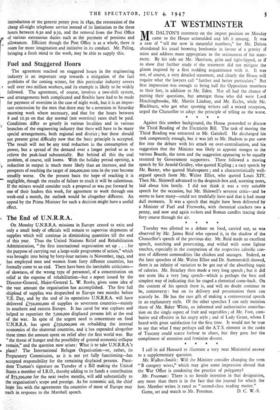AT WESTMINSTER M R. DALTON'S statement on the import position on
Monday came to the House unheralded and left it unsung. It was a case of " tell me now in mournful numbers," for Mr. Dalton • abandoned his usual booming bonhomie in favour of a gravity of mien and address more appropriate to the seriousness of his state- ment. By his side sat Mr. Morrison, grim and tight-lipped, as if to show that further study of the statement did not mitigate the gloom inspired by a first nodding acquaintance with it. It was not, of course, a very detailed statement, and clearly the House will require what the lawyers call " further and better particulars." But first impression was enough to bring half the Opposition members to their feet, in addition to Mr. Eden. Not all had the chance of putting their questions, but amongst those who did were Lord Hinchingbrooke, Mr. Martin Lindsay, and Mr. Eccles, while Mr. Blackburn, who got what sporting writers call a mixed reception, urged the Chancellor to adopt the principle of telling us the worst.
• * * *
Against this sombre background, the House proceeded to discuss the Third Reading of the Electricity Bill. The task of moving the Third Reading was entrusted to Mr. Gaitskell. He discharged his task competently enough, but it was left to Mr. Hudson to put some fire into the debate with his attack on over-centralisation, and his suggestion that the Minister was likely to appoint stooges to the various Boards, the term and the suggestion appearing to be equally resented by Government supporters. There followed a moving speech by Sir Arnold Gridley, who quoted Kipling ; a racy speech by Mr. Baxter, who quoted Shakespeare ; and a characteristically well- argued speech from Mr. Walter Elliot, who quoted Louis XIV. Then -Mr. Shinwell advanced to the despatch-box and, scorning notes, laid about him lustily. I did not think it was a very suitable speech for the occasion, but Mr. Shinwell's severest critic—and he seems to have many—could not truthfully have said that it had many dull moments. It was a speech that might have been delivered by a Minister of Fuel and Fireworks, with rhetorical crackers two a penny, and now and again rockets and Roman candles tracing their fiery course through the air.
* * * *
Tuesday was allotted to a debate on food, carried out, as was observed by Mr. James Reid who opened it, in the shadow of the Chancellor's speech of the previous day. Mr. Reid made an excellent speech, searching and penetrating, and withal with some lighter touches, especially in the comparison of the respective calorific con- tent of different commodities like chicken and sausages. Indeed, as the later speeches of Mr. Walter Elliot and Dr. Summerskill showed, there is an infinity of variation to be got out of the absorbing topic of calories. Mr. Strachey then made a very long speech ; but it did not seem like a very long speech—which is perhaps the best and simplest way of indicating that he staged a rhetorical come-back. On the content of his speech there is, and will no doubt continue to be, controversy: but on its delivery and presentation there can scarcely be. He has the rare gift of making a controversial speech in an explanatory style. Of the other speeches I can only mention those of Mr. Baker White, an informed and authoritative contribu- tion on the single aspect of fruit and vegetables ; of Mr. Foot, com- bative and effective in his angry style ; and of Lady Grant, whom I heard with great satisfaction for the first time. It would not be true to say that what I may perhaps call the A.T.S. element in the ranks of Tuscany could scarce forbear to cheer, but they gave her the compliment of attention and feminine dissent.
* * * *
I call in aid Hansard to illustrate a very neat Ministerial answer to a supplementary question. Mr. Walker-Smith:. Will the Minister consider changing the term "B category wives," which may give some impression abroad that the War Office is condoning the practice of polygamy? Mr. Freeman: There is no hostile intention in that designation, any more than there is in the fact that the journal for which the hon. Member writes is rated as " second-class reading matter."






































 Previous page
Previous page